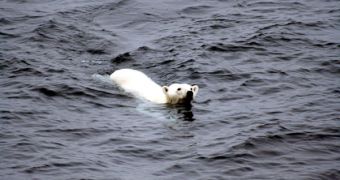On Thursday, all of the five nations surrounding the Arctic have expressed deep concern about the state of the entire region, and especially about the well-being of the polar bears as a species. The beasts face drastic habitat losses, as global warming starts prompting the melting of an increasing number of glaciers. With the ices, the bears' main prey, the seals, also move to other locations or die. It's estimated that, by 2050, the entire polar species could go extinct, and authorities are not about to let that happen.
Representatives from Russia, the United States, Denmark, Canada and Norway have said in a common statement that, “Climate change has a negative impact on polar bears and their habitat and is the most important long-term threat facing polar bears.” The 3-day meeting has taken place in Tromsoe, northern Norway, and represents the first one in 28 years when the countries take another look at their shared 1973 Polar Bear Agreement.
This document regulates the protection of the estimated 20 to 25,000 polar bears still alive in the Arctic. The Directorate for Nature Management (DNM) has announced in a separate statement that, if the five nations refuse to take action immediately, then more than 60 percent of the bears could become history within 40 years. Norway's DNM has been keeping a close eye on the animals for several years, and all changes in their livelihood and food stocks are carefully recorded by its scientists.
“The parties agreed that long term conservation of polar bears depends upon successful mitigation of climate change,” the official press release also stresses. It reveals that the five nations will require the “appropriate” international forums to address this issue as promptly as possible. In other words, they admit that pollution and the large amounts of greenhouse gases emitted into the atmosphere by the fossil fuel industry are directly responsible for the damage recorded in the Arctic and by the polar bear populations.

 14 DAY TRIAL //
14 DAY TRIAL //